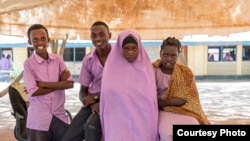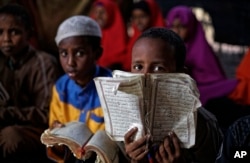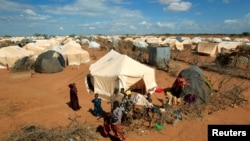Asad Hussein is a 22-year-old refugee. Last August, he got onto the back of a truck in Dabaab, Kenya. He sat down with other passengers among food supplies being driven to Mogadishu, Somalia’s capital.
The truck went across the desert and deep into an area controlled by supporters of the al-Shabab extremist group. On his way to Mogadishu, Hussein got the chance to see where his father grew up.
The New York Times newspaper published his story about the ride.
Now, Asad Hussein is preparing for another trip. He was recently accepted at one of the world’s most famous schools. He is making plans to attend Princeton University in the United States.
Life in a refugee camp
Asad Hussein was born in Dadaab, one of the world’s largest refugee camps, in 1996. His parents and older sister had fled the unrest in Somalia five years earlier in search of a new life. Dadaab was meant to be a temporary stop, but became the family’s home.
In 2005, Hussein’s sister, Maryan, immigrated to the United States with her husband and son. It took 11 years for her and her brother to reunite.
Hussein told VOA’s Somali service that the life in Dadaab is “basically stranded.” You are not permitted to work or to do anything as a refugee, “and the word ‘refugee’ comes with so many restrictions,” he said.
Even with those limitations, Hussein said, people had to make lives for themselves. They had escaped war, and they were prepared to keep on going.
People told Hussein that one way to a better life was education. He kept the words in mind, and has been trying to get into a university for three years after finished high school in 2014.
Princeton has been among the U.S. colleges and universities trying to increase the number of students from different ethnic groups. That includes welcoming students with good grades who, like Hussein, may not have enough money to pay for college. Hussein said he has been offered a full scholarship of $70,010 from the university for the next school year.
In Princeton’s Class of 2021, 13 percent of the students are from outside the United States. They include representatives of 11 African nations.
Last month, Princeton’s president, Christopher L. Eisgruber, wrote a letter to the university community. He wrote that the school has depended on “the talent and contributions of newcomers to this country” since it was founded in 1746.
Last week, Princeton joined 30 other U.S. colleges and universities in questioning the Trump administration's declaration to restrict immigration from several Muslim-majority countries.
A news release said the university gave documents to the U.S. Supreme Court to support the state of Hawaii’s case against the restrictions.
An ‘incredible achievement’
Ty McCormick is a former Africa editor at Foreign Policy. He invited Hussein to write about President Donald Trump’s travel ban after reading his work in The Times.
McCormick told VOA Hussein is “an extraordinary young man.” He wrote that he has learned more things from Hussein “than he has from me.” Hussein overcame major barriers to get to where he is while most people can’t fully understand these difficulties.
“My hat is off to him,” McCormick said.
‘People who can do something’
Hussein wrote about his feelings about living in a refugee camp for Foreign Policy early last year. “The words I write may travel all around the world, but I am confined to the refugee camp where I was born. I can’t move freely in Kenya; I need a permit to leave Dadaab. My whole life, it seems, I’ve been living the American dream. I just don’t know how much longer I can bear to live it outside of America.”
Hussein hopes his success will change people’s minds about what refugees can do.
“When we hear of refugees, we always think of people who want something,” he told VOA. “So I’m glad that my story shows that refugees are actually people who can do something.”
Now, Hussein will be going to the same U.S. school that produced theoretical physicist Richard Feynman, former President Woodrow Wilson and first lady Michelle Obama.
Hussein says he wants to study English and history. And, for the first time since he was nine years old, he will live in the same country as his parents and sister.
I'm Susan Shand.
Salem Solomon and Falastine Iman reported this story for VOANews.com. Xiaotong Zhou adapted their report for Learning English. George Grow was the editor.
______________________________________________________________
Words in This Story
basically – adj. at the simplest level
strand – v. to leave in a strange place
scholarship – n. financial assistance
editor – n. someone who changes or amends a written work
extraordinary – adj. very unusual or different
confine – v. to keep within limits








